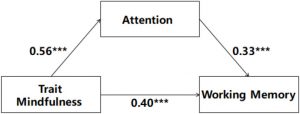Mindfulness Improves the Attention. Memory, and Stress Resistance of Junior High School Students.
By John M. de Castro, Ph.D.
“youth benefit from learning mindfulness in terms of improved cognitive outcomes, social-emotional skills, and well being. In turn, such benefits may lead to long-term improvements in life.’ – Mindful Schools
Childhood and adolescence are miraculous periods during which the youth is dynamically learning and absorbing information from every aspect of its environment. Mindfulness training in school has been shown to have very positive effects. These include improvements in the academic, cognitive, psychological, and social domains. Importantly, mindfulness training in school appears to improve attentional ability which is fundamental to success in all aspects of academic performance. It is unclear the degree to which the students’ levels of mindfulness (trait mindfulness) without training are related to students’ attention, memory, and stress.
In today’s Research News article “The Relationship Among Trait Mindfulness, Attention, and Working Memory in Junior School Students Under Different Stressful Situations.” (See summary below or view the full text of the study at: https://www.ncbi.nlm.nih.gov/pmc/articles/PMC7960675/ ) Li and colleagues performed 2 studies. For both they recruited youths aged 8 to 15 years and measured them for mindfulness, attention and working memory.
In the first study they found that the higher the level of mindfulness the higher the levels of attention and working memory. A mediation analysis revealed that mindfulness was associated with working memory directly and also indirectly by being associated with higher levels of attention which in turn were associated with higher levels of working memory. So, the mindfulness association with better working memory was direct and indirect via attention.
In a second study they separated the students into a high mindfulness group (top 27%) and a low mindfulness group (bottom 27%). They then measured attention and working memory under 3 conditions; stress-free, single stress, and multiple stresses. The stress-free condition was like that used in study 1. In the single stress condition, a time constraint was placed on the performance of the attention and memory tests. In the multiple stress condition, the time constraint was maintained and additionally the students were informed that the results would be used to determine the top students for individual separate instruction in school.
They found that the high mindfulness group had higher attention and working memory scores than the low mindfulness group regardless of condition. They also found that for the high mindfulness group, stress improved both attention and memory scores relative to the stress-free condition with the single stress condition producing the greatest increase. On the other hand, the low mindfulness group had non-significant decreases in performance when stressed.
In the present studies the association between mindfulness and attention and working memory are correlational and as such causation cannot be determined. Previous research, however, has clearly demonstrated that mindfulness causes increases in attention and memory. So, the relationship seen here is likely due to a causal connection. The present study, though, demonstrates that the effects of mindfulness on memory are both direct and indirect via effects on attention.
The present study also shows that stress improves the performance of high but not low mindfulness students. Stress is known to interfere with attention and memory performance. But mindfulness has been shown to reduce the physiological and psychological responses to stress. So, it appears that mindfulness reduces the students’ responses to stress and thereby further improves their attention and memory.
So, mindfulness improves the attention. memory, and stress resistance of junior high school students.
“Students who did about an hour of “mindfulness training” for eight days subsequently did better on the GRE as well as tests of working memory and mind-wandering.” – James Hamblin
CMCS – Center for Mindfulness and Contemplative Studies
This and other Contemplative Studies posts are also available on Google+ https://plus.google.com/106784388191201299496/posts and on Twitter @MindfulResearch
Study Summary
Li, Y., Yang, N., Zhang, Y., Xu, W., & Cai, L. (2021). The Relationship Among Trait Mindfulness, Attention, and Working Memory in Junior School Students Under Different Stressful Situations. Frontiers in psychology, 12, 558690. https://doi.org/10.3389/fpsyg.2021.558690
Abstract
Attention and working memory are important cognitive functions that affect junior school students’ learning ability and academic performance. This study aimed to explore the relationships among trait mindfulness, attention, and working memory and to explore differences in performance between a high trait mindfulness group and a low one in attention and working memory under different stressful situations. In study 1, 216 junior school students completed the Five Facet Mindfulness Questionnaire (FFMQ), and their attention and working memory were tested in a non-pressure situation. The results showed that attention had a partial mediating effect between mindfulness and working memory. In study 2, the high trait mindfulness group and the low one were tested for attention and working memory under situations with single and multiple pressures. One notable result was that the attention and working memory performances of the high mindfulness group were all significantly higher than those of the low mindfulness group in every stress situation (no stress, single stress, and multiple stresses). Other important results were that trait mindfulness moderates the relationship between stress and attention and between stress and working memory. These results suggest that trait mindfulness has a protective effect in the process by which various stresses affect attention and working memory. These findings indicate that trait mindfulness is an important psychological quality that affects the attention and working memory of junior school students, and it is also an important psychological resource for effectively coping with the impact of stress on attention and working memory. Therefore, it is possible that improving trait mindfulness may help to improve junior school students’ attention and working memory and enable them to cope better with stress, thereby helping to improve academic performance. This research is of great significance for understanding the association between key psychological qualities and cognitive functions in different stressful situations. These findings also provide insight for future studies in educational psychology.
https://www.ncbi.nlm.nih.gov/pmc/articles/PMC7960675/









